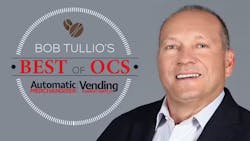After attending industry consultant Josh Rosenberg's education session at the 2025 NAMA Show, I have been increasingly thinking about the importance of branding. His session focused on securing great locations — an ongoing challenge, especially for small operators. I can appreciate the frustration of those small operators. Before my company really focused on the strength of our brand, the biggest and best locations were consistently out of reach.
Branding: The great equalizer
Some of the newer operators at the education session expressed concern that they could not afford to invest in branding or a digital presence. From my experience, if an operator has any intention of being successful and landing better locations, they have no choice but to invest in their brand. A brand strategy is the great equalizer.
In a Forbes article, Kristopher Jones, founder of digital marketing firm LSEO, noted that branding builds trust, which is critically important for any operator hoping to convince larger locations to use their services.
Building trust
“Trust from your audience is one of the most important things you can have as a business, but this isn’t always easy to gain. A business that’s missing key elements of branding will have an even harder time getting people to trust them. Branding is something many of us expect to see when we look at businesses in any industry and missing this could be a red flag to some. Without branding, you have very little to show for your business,” wrote Jones, as he pointed to an obvious conclusion.
“If you had to choose between a business with clear, professional-looking branding and a business that hasn’t made this effort, you probably know which one you’d trust more. Branding helps you show potential customers that you’re an established, credible business. You can use this to tell people very early on what they can expect from your business. This is an investment your business is making to improve itself, and potential customers will recognize that you put in the work to create your brand.”
What is your digital footprint?
Rosenberg noted that to compete with the “big guys,” operators need to invest in digital marketing. “It’s about ROI. You look at a piece of capital that you put in a micro market, or you put out in the street, it’s an ROI, return on investment. Why aren’t you looking at your digital expenditure, your brand, your company, yourself, the same way?”
“Your website, your LinkedIn presence, your meta space. Our buyers are no longer boomers. Our buyers grew up in the digital age of Facebook and Instagram and LinkedIn. That’s how they connect. And post-COVID, you can’t necessarily knock on their doors as easily as you can get to them socially. Engage with your buyers, you must be online. That’s where they’re looking and that’s why my clients are thriving,” he added.
A game changer for Gourmet Coffee Service
A strong focus on branding was a game-changer for my company. We hired a boutique firm — much like Rosenberg’s Forward Thinkers and implemented several specific strategies that were designed to establish our name — our brand — as a major player in the highly competitive southern California market. Those strategies included a strong commitment to:
- Pay-per-click advertising
- A monthly digital newsletter
- Private label promotion
- Social media presence — LinkedIn, Facebook and Instagram posts
- Cause marketing — “Our Brew for a Cure” private label attracted attention and build employee pride
- Marketing materials that reflected the content on our revamped website
- Special client events — Happy hour gatherings, wine tastings and sporting events
- Digital remarketing — Far less sophisticated than what Rosenberg and his team can offer today
- A consistent micro market brand — “Venue Fresh” that resonated with clients. Rather than slap the client’s logos on coolers, we established our brand. We knew it worked when prospects asked us if they could get a “Venue Fresh” market for their company.
When the phone started ringing at our company with bigger opportunities on the line, prospects had no doubt about who we were or whether we were a credible supplier. Our strong branding also instilled a renewed level of confidence in our team members, from sales reps to route drivers.
For those operators who feel they cannot afford brand-building activity, from my experience, brand-building might be the most important thing an operator can do.
About the Author

Bob Tullio
Bob Tullio is a content specialist, speaker, sales trainer, consultant and contributing editor of Automatic Merchandiser and VendingMarketWatch.com. He advises entrepreneurs on how to build a successful business from the ground up. He specializes in helping suppliers connect with operators in the convenience services industry — coffee service, vending, micro markets and pantry service specifically. He can be reached at 818-261-1758 and [email protected]. Tullio welcomes your feedback.
Subscribe to Automatic Merchandiser’s new podcast, Vending & OCS Nation, which Tullio hosts. Each episode is designed to make your business more profitable.

